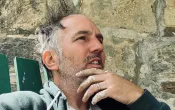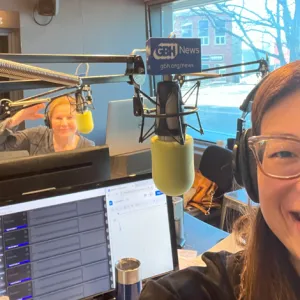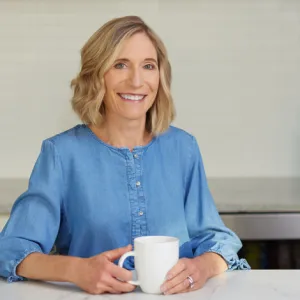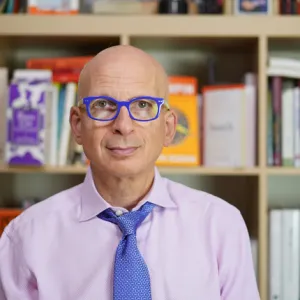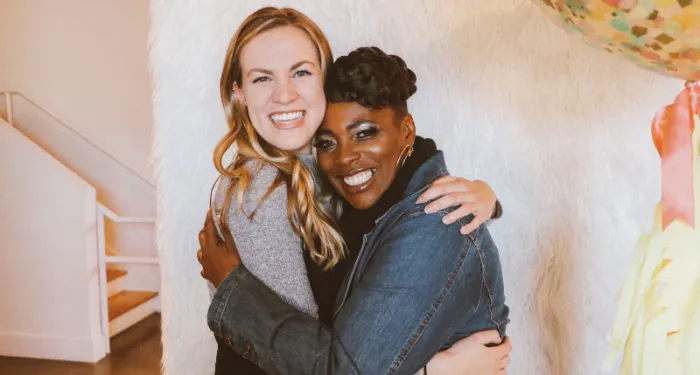
Alexis Corbin
An Unexpected Hero ‘Unlocks’ a Path Out of Homelessness
Alexis Corbin set out to explore an unlikely place and discovered a long lost family member — one who made her life’s mission possible.
Our latest story is of one crazy good turn within another, within yet another.
It starts with a young woman who explores an unlikely place and discovers a long lost family member — and her life's mission.
That woman, Alexis Cook, is the co-founder of an organization called Unlocked, along with her friend Corbin Hooker.
An Idea to Set People Free
Unlocked is a social enterprise jewelry company based in Nashville. They find women who are transitioning out of homelessness and provide them with job and life skills to bridge the divide.
The company's model is a win for everyone, from its customers to its workers to other women trying to get off the streets or out of shelters.
- Women working with Unlocked learn to create necklaces and bracelets to be sold in local boutiques and online.
- The money from sales keeps the organization afloat and enables them to help more people.
- Customers, meanwhile, get handmade jewelry that's both sustainable and beautiful.
At the time when their idea struck, Alexis and Corbin were two students at Vanderbilt University. And while the idea for their social enterprise won contests and earned praise from faculty, the business only became reality through the surprising intervention of an unexpected hero.
Along the way, you'll see how the name "Unlocked" has many meanings and connections with their story. I don't want to give too much away, so at this time I'll jump straight into the interview.
FRANK BLAKE: If you don't mind, I'd like to start first with Alexis and ask you about during your first year at Vanderbilt, when you started doing volunteer work at a transitional housing program called Mercury Courts, you met a man who changed your life and also led you to a storage locker. If you'd tell us a little bit about Mercury Courts, what you did there, and whom you met.
ALEXIS COOK: Absolutely. So, I am actually a Nashville native and went to Vanderbilt already with definitely an interest in volunteering quite a bit and especially with people experiencing homelessness. And so, the first week at Vanderbilt I found myself at Mercury Courts, which is just a transitional housing program in the area.
I met a guy named Ray who, at the time, was in his mid-60s, a Cuban immigrant, and had been homeless for about two or three decades.
On the surface you would think me, a 19-year old girl and him probably had very little in common, but that's really not true. We had a lot in common and became pretty quick buddies. He was something of an adopted grandpa to me, and we would meet up about weekly and hang out at Chick-fil-A or different places like that and just catch up and talk.
Fast-forward to the end of my sophomore year at Vanderbilt. I was diagnosed with Lyme Disease, which at the time, I knew nothing about, other than I had got it from a tick bite. But it quickly became debilitating, and so I had to take a medical leave of absence.
Like I said, I was a Nashville native, so I was still in the area living with my family and just really felt called to start walking around downtown and befriending people experiencing homelessness, which may seem kind of odd to a lot of people.
Not the most obvious way to recover, but I really did feel like it was what I was supposed to do, and so I didn't feel like I had a whole lot of room to argue and just started doing it.
Through some of those conversations and genuine friendships that formed, I started thinking a lot about the opportunity for a company to provide wages for people experiencing homelessness while addressing barriers that they may be facing. I was just kind of mulling that over, thinking about it a lot and went to go visit Vanderbilt to see some friends and got locked out of my car.
FRANK BLAKE: There's the first of the Unlocked.
ALEXIS COOK: Right, right. Exactly. One of many. And so, I'm sitting on the curb waiting on my mom to come bring me the spare set of keys is the unelegant truth and Corbin, who was one of my friends freshman year walks by, and we hadn't spoken I mean really, in probably two years, since I had lived in the same dorm as him, and he walked by and was like, "Hey. I heard you're out of school. Tell me what's going on."
And so, I start talking about how I'm sick, but I've been wandering around downtown befriending all these people experiencing homelessness and was thinking a lot about it. And he just is being nice and sits down beside me, and we start talking and come up really with a rough business plan of what we could do that would be meaningful.
And so, we decided to start meeting up weekly and it was nice for me just to kind of have something to take my mind off of all of my treatments and just have something theoretical, but in the back of my mind I also did think, it would be interesting to see if this really becomes anything.
FRANK BLAKE: Now you're starting this conversation with somebody you don't know really well, but she's locked out of her car and you start talking about starting a business to help the homeless. Tell us how that connected with you and your heart.
CORBIN HOOKER: Yeah. So, my experience coming at it from a couple of different directions. The first was that I studied political science, history, and economics during my time at Vanderbilt and I gained a real appreciation for the economic and social inequalities that we face in our society.
Especially being in Nashville, with the housing prices going up so dramatically and Vanderbilt being a relatively urban campus, the Vanderbilt bubble as we call it, could not shield from me seeing those economic injustices take place around the campus, just walking to go get food.
I think homelessness is a very visible problem in Nashville and I sort of found myself, like many others, not knowing necessarily what I could do or what I was supposed to do. And as the years passed at Vanderbilt, I gained a real appreciation for my desire to do something, and I had no idea what it was going to be.
So, when we had this conversation sitting on the curb, I knew that it was real. And from the very beginning, it was certainly theoretical and the company didn't end up turning out at all like what we were discussing back then but I knew that if we really pressed for it that it would certainly become real.
FRANK BLAKE: Out of curiosity, what was the idea at first? Where did you start?
CORBIN HOOKER: The reason why we got talking about it was that I had seen a video on Facebook of I think some government agency in Arizona that would drive around town and employ people experiencing homelessness just to do a day's worth of labor doing city beautification, street cleaning, things like that and would just pay them in cash.
I had just recently seen that video, so when Alexis said that she wanted to find a way to employ people, I immediately just mentioned that and that was our starting place. We thought maybe we could replicate their model exactly
FRANK BLAKE: Then over time, you guys sit down and worked this through? I mean, or did you hash it all out before the car was unlocked?
ALEXIS COOK: We just started sitting over time and talking about it making more and more concrete and like Corbin said, started out as a potential lawn care company, which is hilarious because we ended up as a jewelry company, which goes to show that we were less concerned, honestly, about the revenue-generating component and more concerned about the mission behind it and how we would be as a company, not so much what we would be doing.
As we were talking more and more about it, we decided on jewelry because we thought it was a way that we could one, create beauty in the world and really empower the people that we would work with. But two, the blunt truth is that it was something we could start with pretty low capital and learn and train easily.
We knew we wanted to be transitional employment, meaning that our goal would be everyone we work with would quote graduate and move into a home and job of her own, and so we would be continually training, so we wanted something that we could train quickly and effectively.
ALEXIS COOK: But the next crazy good turn after the curb was that the end of our junior year, by that point I was back in school, albeit still pretty sick but back in school enough that I could graduate anyway. And so, that's around the time when everyone starts asking, "What are you going to do with your life? What's going on next?"
And so, I started fasting and praying is the truth about what would be my next step, and if this, actually at the time unnamed company, would be something that I would actually pursue with Corbin or if I would need to start applying for jobs outside of that.
As I was in this kind of period of discernment, Ray, who we'd already talked about as really my adopted grandpa called and didn't even start with, "Hey. How are you doing?" Just straight to the point, "Alexis, you need to come to the hospital. I'm dying." And so, obviously, I go.
We have just this amazing bedside conversation about his life, and what it had meant to him, all of his successes, his failures. As I got up to leave, he pulled me in a little closer and was like, "Actually, before you go, I wanted you to know I have a storage unit. And in this storage unit, I have a duffle bag of money, and whenever I pass I want you to have it."
ALEXIS COOK: And Ray had known about the business I had been contemplating but I think it was really just his way of passing on a legacy of sorts, which is kind of crazy that in a time of discernment, a man who literally didn't even own a mattress, would become the primary investor in a company to employ other people experiencing homelessness. But that's exactly what happened. So, I took it as the sign I had been seeking, and we began Unlocked.
FRANK BLAKE: So, was your reaction, "Oh, that's not likely." Or the duffle bag may not be a duffle bag, it might be a little paper bag. This can't be right.
ALEXIS COOK: Honestly, not at all. By that point, I had known Ray for I guess going on three years and trusted him inherently. And so, I knew whatever he said it that it was true. I didn't know how or what it would look like or anything but I knew it was true. I was less concerned at the time about the logistics of it because I was more concerned obviously about him passing away.
FRANK BLAKE: So, sometime later, you unlocked the storage unit. And what's there?
ALEXIS COOK: A lot of things actually. So, Ray had a collection of different toy trains that he'd kept. We actually kept one and it's in the Unlocked office now kind of as a memento of his legacy. But nestled underneath everything else, there were lots of papers, and diaries, and such.
Nestled under all of that was, in fact, a duffle bag of money. Just cash. And so, it wasn't a ton of money by any stretch, it was just a few thousand dollars. But it was enough for us to file as an LLC, we're a for-profit, buy some equipment, and begin training our first maker on jewelry.
FRANK BLAKE: Pretty amazing crazy good turn that Ray does for you. What do you think he sees in you that leads to that?
ALEXIS COOK: I'm really honored that Ray would choose to leave essentially his entire life savings to me before passing. We were really close and I don't take it lightly that he trusted me with kind of everything he had. I don't normally share this but actually, before he passed, he told me that his greatest success was adopting me as his granddaughter.
FRANK BLAKE: Wow.
ALEXIS COOK: Which was really touching. He was an amazing man, and so I'm just honored that I was able to spend as much time with him as I did and get to know him really well. And I'm really thankful that I had the opportunity, kind of zooming out, to even meet him and be able to serve and meet him because it's not like our paths would have naturally crossed.
We were from different parts of town, different backgrounds, but I think there's a lot of value in spending quality time with people who are vastly different from you and I'm glad that I had that opportunity and that it changed so much about the trajectory of my life.
FRANK BLAKE: Did he have any phrases or saying that made a particular impact on you that come back to you from time to time?
ALEXIS COOK: Yes. Actually, it's crazy that you mention that because I was just thinking. His final words to me, literally on his death bed, were, "If we serve a God who is all-loving and all-powerful than it's impossible that anything bad will ever happen."
ALEXIS COOK: Which was so powerful. He was very at peace before passing and that really stuck with me that those were his final words.
FRANK BLAKE: What an extraordinary story. So, with partially some of the money from the duffle bag from Ray, and I understand you got some money from doing a presentation. You were pitching this idea at Vanderbilt. You're able to launch Unlocked. What had to happen in order for your idea to become a reality?
ALEXIS COOK: A few things. We had to start by obviously hiring our first maker. We call our employees makers, which you could probably intuit is because they are literally making the jewelry. And so, we hired someone actually from the same transitional unit that Ray had been staying at, so I had known her for a while, and she was just a friend of mine. We began just experimenting with jewelry.
Corbin and I had no background in jewelry or really design. Corbin had a background in graphic design but that doesn't, as you can imagine, translate exactly to jewelry.
And so, we started just making things on park benches after class. So, we were a very transient company. It was not something that you'd really want to hang our hat on and be like, "This is what I'm doing post-grad." But we were just really confident and I would say bold, and thought, "You know what? We'll keep doing this post-grad and see if we can turn it into something."
We were lucky enough to, I wouldn't even call it gain a contract, but more just a partnership with Community Care Fellowship. They're an amazing nonprofit in East Nashville. They're a day shelter for people experiencing homelessness, and they have hot meals, warm showers, laundry, basically all the things you'll need that are immediate services.
So we started partnering with them and started working out of one of their back storage rooms at their space, which wasn't much but it was definitely enough that we could really grow as a company, hire a few more makers, and start really selling our products mainly at events and through different boutiques.
FRANK BLAKE: Then does this start to get momentum? When do you start feeling, "Boy, this is actually going to work"?
ALEXIS COOK: If I'm being completely honest, I feel like it's always up and down, even still. And like, all right, boy, now it's really going to work.
FRANK BLAKE: Good answer.
ALEXIS COOK: That's the truth. I think it would be a false narrative to say that there was a point at which I was like, "This is it." I think there have been a lot of small points and there have also been a lot of small painful points that have been hard where I'm like, "Is this going to keep working?" And thankfully, it does.
FRANK BLAKE: So again, for both of you, social enterprises it's a growing field, they're a growing field, but still pretty outside the norm for business. What have you learned that you wish you knew at the beginning?
CORBIN HOOKER: So, in the world of social enterprise, and this is a tough piece of advice to give myself two years ago because I wonder how much capacity we would have even had to act on it, but I really strongly believe that if social enterprise is going to work and be a viable model of social change that at its core, it has to be a successful business. And you have to provide a good or service that the market wants, I believe irrespective of the social mission.
Through that, you're going to be able to achieve scale and based on the structure of social enterprise with scale comes impact, and comes capacity to have impact. And especially with such a complicated issue as homelessness impact is not only how many we can employ but what impact do we have in the broader community in terms of bringing resources together, nudging the government to have a bigger role. That can only be achieved through scale.
We spent a year and a half I would say really struggling because we didn't really have legitimate product market fit. In the beginning, when we graduated and decided to go full time with Unlocked, people were purchasing our products because they believed in us, and they believed in the mission.
They wanted to see us continue to grow and succeed, but at the end of the day, not entirely because they wanted the product. And now that we've made this transition, I think that we can be very assured that there is a larger scalable story for Unlocked because we're providing value in the world of jewelry that's beyond just our employment model.
It's our pieces are more environmentally friendly than other types of jewelry and there's a big demand for that.If I would have told myself that two years ago when we were getting started, a couple thousand dollars in hand, no jewelry skill whatsoever, we might have just quit if we felt that we had to have legitimate products.
FRANK BLAKE: Where do you see Unlocked five or 10 years from now?
ALEXIS COOK: Honestly, I think that's hard to answer at times because we've gone through so many kind of like Corbin said, different shifts at least with our jewelry lines and things like that. I think most important right now is scale, so that we can employ more women transitioning out of homelessness and really deepen our impact.
We work with a lot of nonprofit partners, which I would say is another huge piece of social enterprise advice is making sure that you really understand what's already being done in your topic of interest per se, so in ours homelessness in Nashville, and that you're working with people who have been doing it much longer than you have.
That's been huge for us is all of our nonprofit partners we work with, a lot of great organizations to provide career counseling, mental health counseling, financial training, transitional housing, we make sure that everyone's in housing before their first day of work, so that's been huge for us.
And I think as we continue to scale and are able to provide more resources and more employment opportunities for people, that would be great. my goal would be that we'd keep expanding through all of our different sales channels including off label production, and hopefully be able to create similar off-site locations with the same mission, same manufacturing lean, and kind of spread that model across the US.
CORBIN HOOKER: We came into this thinking we're doing jewelry as a practical decision but not because we have a lot of expertise in it.
We've learned that expertise, and we've built a viable business around jewelry but our hearts have always been in the pairing of employment and housing, and creating a powerful next step for people, a powerful transitional program and space for people. And for us, that's entirely built around the fact that we're a business that creates jobs and employs people but that doesn't necessarily have to be jewelry.
So, in five to 10 years, it's a question that we keep coming back to. Are we going to only do jewelry or are we going to ethically and environmentally friendly manufacturing? Are we going to expand that to produce other types of goods or get into other industries entirely and focus more on the model?
FRANK BLAKE: As I was reading some of the background material, I saw a quote, Corbin, from you about the fact that work is tied to dignity, which definitely true. Is there a particular maker whose story of finding dignity has really touched you?
ALEXIS COOK: Absolutely. One of our first makers actually, this was before we were even partnering with other nonprofits officially, so it was just someone that I had met kind of randomly like I mentioned, but her name was Gwen. She was just an incredible woman to start working with
She had experience as a teacher, and unfortunately, had to leave after a domestic abuse situation, but wanted to get back to that. And so, after working with us, and gaining some career connections, and establishing savings, and really just gaining the stability and confidence that she needed, she was able to get a home of her own and start working as a Pre-K teacher. So we are incredibly proud of her, needless to say.
And that's exactly the trajectory that we would want for all of our makers is that they would be able to use Unlocked as a stabilizing force in their lives and be able to go after what their longer term goals are.
CORBIN HOOKER: When you asked earlier about what was a singular moment when you felt like this is going to work, her graduation celebration after she had moved into her own housing and began working as a Pre-K teacher.
That was a really powerful moment for me because it was even more for her. She got a stable job, and she got stable housing, but it was clear that, like you were saying, she benefited from her time with us in even more ways than that, and she was able to regain confidence in herself and the belief in herself that she needed to fulfill her dreams.
FRANK BLAKE: This is an odd question coming up, but you could tell from the introduction that I'm fascinated by the choice of the company name of Unlocked because of my experience selling home improvement goods. It reminded me of a saying that, "A key that opens many locks is worth a lot, but a lock that can be opened with many keys isn't."
Odd saying but that kind of came to mind reading your story. And I wonder if there's a learning there of a key that opens many locks. When you say Unlocked, what is the key that you think opens many locks?
ALEXIS COOK: I love that. First of all, it's a great saying. I'll start saying that too.
I think obviously the immediate connotation with Unlocked if you've heard our story is unlocking Ray's storage unit, and that was really why we named the company how we did. We chose the name that day.
More metaphorically, and I think more pertinently, we really care about unlocking opportunities for our makers, so that's why we talk about employing and empowering our makers. We really want them to feel the authority to make choices in their own lives and do what's best for them.
We believe strongly that having lived through their whole lives, they know more about them than we do and that we're just there to offer opportunities and resources, and they get to choose what they're going to take advantage of or not take advantage of. So, it's really about empowerment for us.
And unlocking dignity I think is a big one that you already kind of touched on. And just some of those maybe more internal things, like self-confidence that Gwen spoke a lot about at her graduation speech. Things that can't always pointed as like, "This is what we're going to write our grant for," but I think are really important.
Community is another huge one. We do community bonding activities on a regular basis with all of our makers. We believe it's important to have a social network that will hold you accountable to your goals and also support you in hard times, and so that's really important is that our makers graduate with a strong sense of community with each other.
CORBIN HOOKER: And I would say that specifically community support as the key that opens many locks.
Unlocked cannot provide everything that our makers need. If we didn't have the support of other organizations in the community, if we weren't a part of a larger solution, we would not have success. I believe that other organizations feel that way as well.
FRANK BLAKE: Those are such great answers, the dignity, a sense of self-worth, and community are keys that unlock many locks. That's a really very profound learning.
ALEXIS COOK: Thank you.
FRANK BLAKE: If you could ask one thing of our audience, what would it be?
ALEXIS COOK: I think there's all sorts of vocations that are incredibly important for the well-being of the rest of the community. I do think it's important that really every member of society takes the initiative to spend time with people who are different than themselves, kind of like I talked about in the beginning with Ray.
I think there's real value in getting to know people whose stories are really different from your own and can maybe widen your horizon of what you think is possible.
FRANK BLAKE: When you look around you at your colleagues at school and now post-school, and if you say something like that, does everybody nod and say, "Yep. We agree with that. We do that"? Or do you think everybody kind of looks at you and thinks, "A little bit loony."
CORBIN HOOKER: I think that we're at a point where everybody would agree with that. They would nod their head and say, "Of course. Of course, we need that." But in practice, it's so much harder and then that's really the difficult part of asking it of people.
FRANK BLAKE: Right.
ALEXIS COOK: I agree. I think even in our political spectrum right now, there's a lot of different ways that diversity can take space and I think that, I agree that people would say that's important but I think it's much harder to put it into practice.
FRANK BLAKE: I got two final questions for you. What do you think within yourselves provides that energy and drive to connect with people who are different and respond in a generous way to that?
ALEXIS COOK: I would say for myself it's definitely my faith. I believe strongly in the dignity of all people and that everyone was created by an all-loving father, so it makes it kind of a command in my heart that I need to care about everyone whether or not I see myself in them in different ways.
Whenever I get to know people, I realize that I do see myself in them. But I do think it's really important to see other people as just as valuable as you, regardless of the preconceived notions you may have about them or their experiences.
CORBIN HOOKER: Every aspect of our lives to me feels deeply intertwined with everyone else's. And I deeply believe that we cannot be free ourselves until everyone else is free too and that the empowerment of others is the empowerment of ourselves through the community.
FRANK BLAKE: Final question. How do our listeners stay up to date about you and what you're doing?
ALEXIS COOK: Our website is www.becomeunlocked.com. Our Instagram and Facebook are both @becomeunlocked, #becomeunocked. You can also sign up for our newsletter on our website if you just scroll to the bottom, you can get 15% off your first order that way actually.
FRANK BLAKE: Perfect. Well, I can't tell you what a treat it's been to have you on Crazy Good Turns and thank you for all that you're doing.
ALEXIS COOK: Thank you so much. We really appreciate it.
CORBIN HOOKER: It's been a pleasure.
